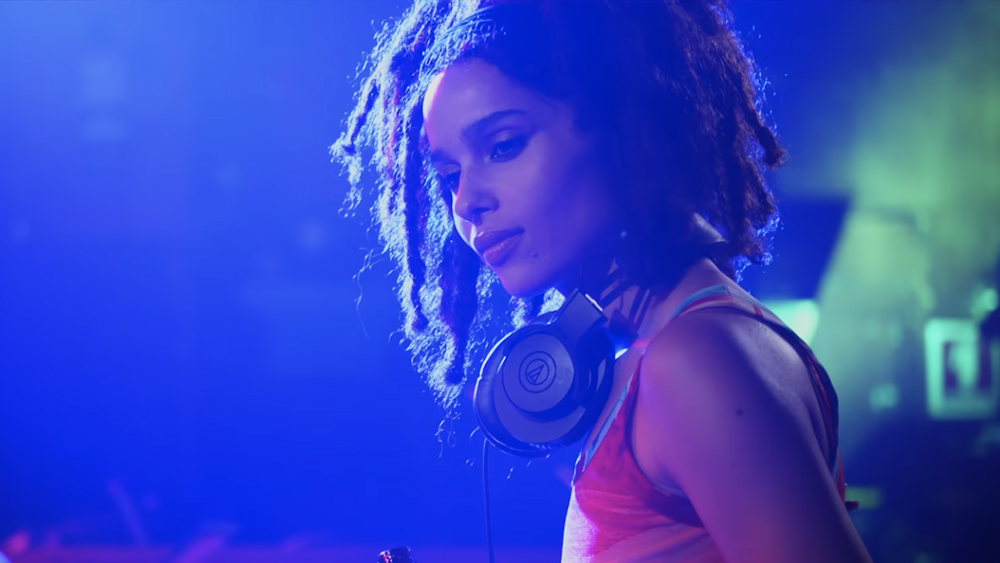Zoë Kravitz in ‘High Fidelity’: TV Review
By Daniel D’Addario
LOS ANGELES (Variety.com) – For a show built around its central character’s obsession with music, “High Fidelity” makes some pretty generic choices. As Zoë Kravitz’s character Rob reflects on the nature of romance, she plays David Bowie’s “Modern Love”; thinking back upon the defining relationship of her life — now concluded — she hears Sinead O’Connor’s “Nothing Compares 2 U.” And when, in the pilot, she rocks out with her two employees at the ultra-esoteric record shop she owns, it’s to the Dexy’s Midnight Runners cheesefest “Come On Eileen.”
Maybe three Brooklynites for whom music represents not just pastime but identity could go there ironically. But many of “’s” song choices seem to represent an easy first thought (surprising, given the fact that its music supervision team includes Questlove of the Roots). This works, somewhat, to broaden out “High Fidelity” — a property that began its onscreen life as the story of an obsessive played by John Cusack (also named Rob) but finds its way to more general appeal narrating the less obviously neurotic Kravitz character’s choices. But it also suggests “High Fidelity” doesn’t have a deep confidence in what it’s about, or for what audience it might be intended.
The show, to its credit, looks great — set in an endless-summer Brooklyn of the mind, where bar, coffee shop, and vinyl purveyor, all scruffily but appealingly indie, are the landmarks of note. When Kravitz walks past a Starbucks, it feels jarring, and like an incursion of corporate reality into an Eden. (Rob’s shop, caught between Brooklyn’s past and future, seems to sit astride gentrification, a subject that haunts the show’s cute filming locations but is never made text.) The show exists in a state of self-aware fantasy — after all, record stores have grown thinner on the ground since the film “High Fidelity” was released in 2000, and Rob’s store, which sells vinyl and cassettes only and which tends to have more staffers than customers on premises (all the better for banter) hardly seems like a growth enterprise. This buoying mood of lovely impossibility serves as a good counterpoint to Rob’s love life, which is riven with painful mundanity — the cycle of recriminations and angst in the long-tail aftermath of a breakup, a process she narrates to camera.
All of which the show draws well, but a bit too hazily. Summer’s golden dreaminess looks good over the low-slung streets of Crown Heights but doesn’t render as well on a screenplay. To wit, here’s Rob walking us through a date: “We bond over books, TV, music, movies.” (Oh, right, those; I’ve bonded with people over those too. Who hasn’t?) She goes on to say that “We express our shared opinions on Joan Didion, J Dilla, dubstep, ‘Escape from New York,’ sports, Mexican food.” All of these seem randomly chosen as signifiers of a certain creative-class boredom — the writer as famous for her author-photo aesthetic as her work, a late artist and a music genre to impress upon us that Rob doesn’t just listen to “Come On Eileen,” a self-consciously campy movie choice, “sports” — and not as things Rob has an opinion on at all, shared or no.
Kravitz, so manifestly underused in “Big Little Lies” — a show whose second season promised to foreground her but found it had nothing to say about her character — gets to play lead, and she’s a good one: Warm, natural when speaking to camera, so inherently able to find an internal logic to her character’s dithering. But the story needs more help than Kravitz can give it, leaning on a fairly simple and uninteresting sort-of-love-triangle (she misses her ex, who is now engaged to someone else) that would not exist without coincidence and fairly unbelievable behavior on the part of all parties. (Rob’s ex, played by Kingsley Ben-Adir, alternately hates Rob or acts like a man about to cheat with her, depending on what the story demands that moment.) Worst of all, there seems to be no motivating force behind the story: “High Fidelity,” the film, told a story of a man whose fetish for collecting and cataloging meant that, in love, he was unable to be present and human. “High Fidelity,” the TV show, has created a character who likes music and wants to be loved. Both of those traits are good starting points, but as endpoints — and placed into conversation despite being basically unrelated — they’re not enough.
Sometimes, though, this (despite it all!) very watchable show snaps into being something more, as when involving the clerks at the record store (David H. Holmes and Da’Vine Joy Randolph). Randolph, a talent who also appeared in last year’s “Dolemite Is My Name,” lends texture and an intriguingly prickly dynamic to the workplace, while Holmes, playing a single gay man, gets a stand-alone episode devoted to his own troubles in love. It’s about his hangups and insecurities in a relationship with a wealthy lawyer, a coupling that switches on and off due to the real faults of both parties. It feels situated in place, in social class in a way none of the rest of “High Fidelity” ever does, and in the dynamics between people who are more than the list of signifiers recognizable as being of the brunch set in Brooklyn. It suggests what “High Fidelity” might become once it moves beyond what’s been a lengthy but insubstantial first-date conversation with its audience, and once it trusts itself enough to give its lead a bit more specific and interesting song or two.

